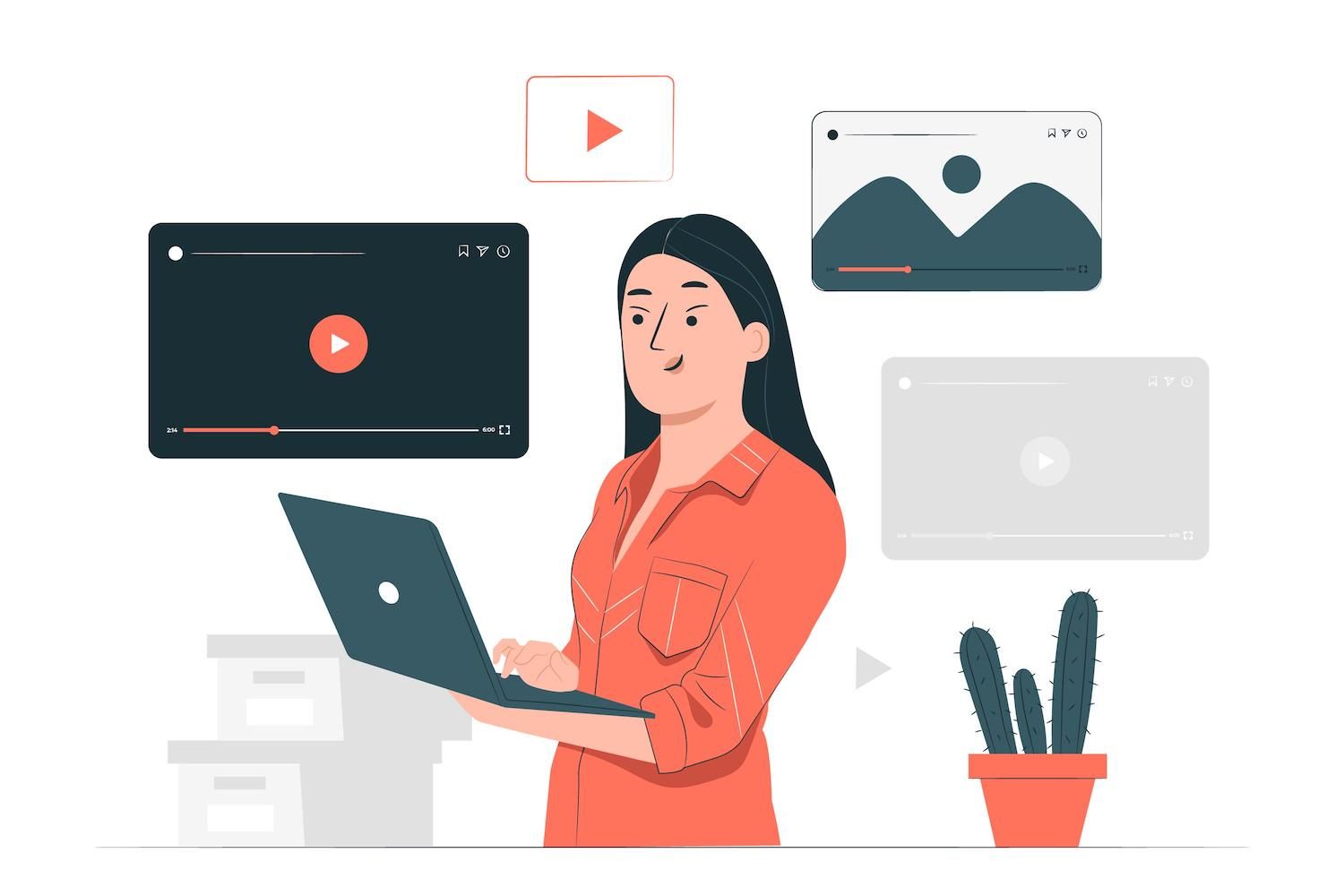What exactly is a digital business? (And How Can You Become One!) |
What do Doug Neill, owner of Verbal to Visual, who offers courses and memberships to students who are visual; Sadie Robertson Huff who is the founder of Live Original, who has an app, podcast as well as hosts events for young women who are seeking greater spiritual growth and faith as well as Ashley Fox, owner of The Wealth Builders Community, who offers memberships to those looking to build wealth all share in common? All three are digital entrepreneurs.
As the world changes and evolves, so do the business world. If you've got an amazing idea but would prefer some at your own pace and enjoy a flexible schedule, then becoming an entrepreneur who is digital might be the right fit for you.
This is what we'll be covering in this article:
- What a digital entrepreneur is.
- Types of digital entrepreneurs.
- The benefits of being an entrepreneur in the digital space.
- How to become an entrepreneur in the digital space.
((toc))
What is a digital entrepreneur?
Digital entrepreneurs are those who operates their business on the internet. There's no standard for digital entrepreneur; it is possible to be an online course creator, or virtual assistant to being a blogger or podcaster. Digital entrepreneurs can sell products like business coaching digital goods like e-books as well as physical goods like candles. The possibilities are limitless.

A digital entrepreneur typically doesn't require fancy equipment; it's possible that you only require the laptop. You can use social media to increase awareness of your brand, set up your own website and utilize emails to build and establish a connection with your target audience. The best thing about digital entrepreneurship is that it could earn as much money as you make in a business without the expense of physical requirements like storefronts.
Digital versus traditional entrepreneurship
What separates a digital entrepreneur from traditional entrepreneurs is the location they work. Traditional entrepreneurs have as a physically-based business for example, a shopfront or pop-up shop. There are benefits and drawbacks for both.
The biggest upside for online entrepreneurs is the fact that they do not need a lot of funding for their venture (you do not require outside financing for the start-up phase and are able to bootstrap your company) and their expenses are quite minimal. The main challenges of being a digital entrepreneur are:
- You compete with the whole world (instead of the geographical region you reside in)
- You need to work harder to build credibility and trust
- Customers who are interested in purchasing your product can't view the product on their own and are forced to go on reviews.
- Digital entrepreneurs could find it difficult "turning off" and setting business time limits for themselves because they are able to work from anytime and anywhere...even the couch. This could lead to burnout.

Traditional business owners can utilize digital tools as well, to for example, leverage social media in order to increase the awareness of their company. If they own a shopfront additionally, they can enjoy an advantage with foot circulation -- who is passing by, looking at the gorgeous red dress that is on display and contemplating, "I have to have this !"
Traditional entrepreneurs also have set business hours so may be less inclined to burnout. Of course, the biggest disadvantage to being a traditional entrepreneur is that they require more funding for the establishment of their own storefront and incur greater expenses in order to run their business. This is more as opposed to digital entrepreneurs.
Types of digital entrepreneurs
You can see that there are so many examples of what digital entrepreneurship might look like. This is especially true as new tools and technologies are released, which means there are endless possibilities. These aren't mutually exclusive examples either; a lot of digital entrepreneurs mix these examples in order to expand their services. Below are some typical types that digital entrepreneurs can take advantage of.

Community Hosts
We've learned a thing or two about the creation of an online community. One great way to build a community is through their passion. Take, for instance, ArtSnacks Mix built around the joy of painting and Outwild Hub is a group for outdoor enthusiasts who want to make the outdoors a bigger aspect of their lives.
Communities are becoming thriving digital enterprises We're witnessing them grow to 6-, 7-, and even 8- figures!
Digital entrepreneurs can earn profits from their communities by creating a membership fee to the members of the community. They could also hold live events, start an app with their logo, or create a course that they provide exclusively to their community members.

And there are a ton of types of internet communities that you can choose from. Below are a few of them:
- Mastermind group: Members come together to share their know-how and help transform their companies or their lives.
- Group coaching: A community led by a coach that connects the members to achieve a change (e.g. holistic health Coach ).
- Micro-community: You don't require an extensive community in order to have a big difference. It only takes 30 people or less, who are dedicated to pursuing a specific subject or interest, goal or a passion.
- Community of Content: Members get together to make and/or develop content, and share their experiences.
- Online community for brand: This type of community has members-led growth driven by those who are excited to talk about their brand or products. Consider, for instance, the QuickBooks community, a place that allows users of the product to get the knowledge they need. Another awesome instance of a digital brand group is Adriene Mishler (who started Yoga along with Adriene on YouTube). The community she created was designed to assist her more than 10 million viewers get more involved in the practice of Yoga and to connect with other people, so she launched the Find What Feels Good (FWFG) Kula Community.

Blogger
If you're passionate about writing and have something to say it could be an ideal way to get started in digital entrepreneurship. After you've identified your area of expertise and chosen a name for your blog (make sure to use our blog name generator) it's time to provide worth. Bloggers like Seth Godin and Neil Patel offer a wealth of information through sharing marketing tips to their readers.
Contrary to popular opinion there is no need for an abundance of visitors for your blog in order to earn money. You do require a strategy (because your blog shouldn't be your diary). Also, you must remain persistent and be patient.
Bloggers can earn cash in numerous ways, such as:
- affiliate marketing: When you mention the products you sell on your blog, when someone clicks on a brand-approved tracker link, you could receive a commission.
- Advertisements: If you permit other businesses to advertise via your site, you get the money. Advertisements can be paid per view or per ad (also known as the revenue per mille, also known as RPM. ).
- sponsorships In the event that you're getting enough traction and are able to attract enough attention, companies can pay you a fee to create a sponsored blog post.
Bloggers may also earn income by selling courses, e-books, or merch through their blogs.
Of course, the methods to create written content change constantly, with some choosing to publish content on platforms like Twitter or LinkedIn instead of a traditional blog platform.

Podcaster
It's never been more simple to start and grow your podcast! There are so many big names out there making bank by podcasting. Some of them include "Armchair Expert,"" "Call Her Dad,"" "Office Ladies" and "Freakonomics Radio ."
While you're still getting your feet wet in building a fan base that appreciates the work you do, you could still make a profit from your podcast. As with blogging, you'll want to find your niche (not only something that's popular, but one you're interested in) You should also have a good title (use the Podcast Name Generator), and create plans for the release of new episodes, increasing the audience to engage, as well as arranging guest speakers. Be aware that building your fan base requires time. Keep your patience and be constant.
Podcasters earn profits through:
- Paying members get access to premium programming such as video clips, Q&As hosted by special guests, early access to podcasts, and private group discussions. Certain podcasters earn money through a community by selling different memberships.
- Making courses: If your show is educational or teaches listeners new skills, creating courses is an excellent opportunity to make money through your podcast. Just look at Gretchen Rubin, who has self-development and personal development podcasts, "Happier with Gretchen Rubin." Her self-improvement courses are self-paced. programs that align with the theme of her podcast like "Outer Order as well as Inner Calm," and "30-Day Relationship Challenge." ."
- Affiliate marketing: With the use of affiliate marketing on podcasts, hosts receive an income every when a listener purchase a service or item that is mentioned in the episode. This is tracked with a coupon code (members typically receive 10-15 percent off of the service or product, which gives them more motivation to purchase ).
- Sponsorships: Have you noticed commercial breaks that pop up while you're listening to a podcast? It's a sponsor. This is different from affiliate marketing because the sponsor is paid for each time you mention the brand (e.g. the flat cost to talk about them for seven episodes) however, your viewers never pay one cent for the brand.
- Live events: Many of the most popular podcasts, such as "Giggly Squad" have built up such a huge fanbase that they've gone for live events. Even if your following isn't quite as large, think about organizing a live show in your area in a pub, restaurant, or even a bookstore.

YouTuber
YouTube is the world's second-largest search engine (and is owned by Google- the biggest), and top YouTubers like PewDiePie, Markiplier, and Like Nastya earn anywhere from $28 million up to $38 million annually!
Although there's an abundance of competition on YouTube (over 720,000 hours worth of video uploaded every day) however, the key to gaining a YouTube following is having a niche that is strong and producing content within the area of. Similar to podcasting and blogging, it requires an enormous amount of determination and persistence to grow a fan base on YouTube.
Here's the way that YouTubers make income :
- Ads: In order to be able to advertise, you must meet the minimum requirement of at least 4,000 hours of watching in the last 12 months and 1,000 subscribers. It's not the most effective way to make money, however it is how YouTubers with huge followings make cash.
- Channel memberships: Like with ads, you'll need to be a subscriber of more than 1000 and join the YouTube partnership program. Then, you can offer members perks like badges, emojis as well as live chats and many more.
- Affiliates: YouTubers get a fee each whenever a user purchase a product or service mentioned in a video (affiliate affiliate links are listed inside the title of the video).
- merchandise: If you're a well-known brand and you are able to sell merchandise.
- Selling services: Let's say you're a fitness coach, you could give tips for fitness on YouTube and link it to the fitness business you run.
Learn more about how much YouTubers earn per view on this page .

Consultant
When you're an experienced expert at solving a problem, consulting can be a great method of earning money for the work. It is possible to offer your knowledge to companies that require it and post your articles on LinkedIn and YouTube as a type of marketing. Having some solid testimonials from former clients and figures to prove your worth be a good way to establish yourself as a consultant. Consultants can work either on an hourly retainer or on deliverables basis which can be a lucrative way to earn hundreds of dollars per hour to cover their expenses.
Consulting entails offering the client data in order to assist clients in enhancing their company. They can help organizations with their marketing, sales technological, informational Intelligence, Diversity and inclusion initiatives, as well as the resolution of conflicts.
The most appealing aspect is that digital entrepreneurs can seek advice from anyplace in the globe.

Subscriptions
Digital entrepreneurs are able to create an online subscription company and provide subscriptions. The model is very similar to the online community, but is more passive; subscribers simply access content, software or other products you've developed or licensed. Imagine software companies such as Dropbox and Zoom and others that offer content like Hulu and Netflix as well as those with physical items like HelloFresh - they've built businesses around subscription services.
Let's look at how digital marketers are able to profit from subscriptions:
- Premium content businesses: When people pay every month, and have access to videos (e.g. fitness videos) ).
- A monthly product: Certain businesses offer monthly subscriptions to essentials like razors and soaps to extravagant items such as wine and chocolate.
The great news is it could be a recurring revenue if you can make your repeat business idea make sense for your business.
newsletters are also growing to be a major part of the subscription economy.

E-commerce
It's not just a trend It's growing exponentially and is expected to reach $3.6 trillion by 2024. One of the advantages of e-commerce is that it's not just meant for big corporations. It's for everyone, including digital entrepreneurs.
There are many platforms that you can sell on, like Amazon as well as Alibaba and if you're creative, consider Etsy. You can also use Shopify for digital entrepreneurs looking for a platform on which they can build an online store they manage.
The options for what online entrepreneurs sell are limitless, from physical products such as shoes, lamps for mushrooms as well as art as well as digital goods such as e-books, printables and apps (which is projected to reach $755.5 billion by 2027), and online courses. Digital products are advantageous as they're scalable and infinitely adaptable they generate revenue recurring and can be easily automated.
Course creator
The truth is that online learning has skyrocketed over the past couple of years. Thanks to online course platforms it's never been easier for digital entrepreneurs to transform their experience and skills into an amazing education experience for anyone around the world can take. Indeed, online courses can be so lucrative that we witnessed a podcaster and author on Mighty sell 5,000 seats on a $997 course in just 10 days.
Online courses can be about practically anything, including 2D animation to learning how to draw. The courses can be recorded (asynchronous learning) or taught in live (synchronous learning) and both can be expanded, as teaching live, you can teach to many thousands of learners.
We're certainly not saying that building courses is simple- you need to find the right niche, design your course and promote it. The most profitable niches consist with being fairly popular where people are taking courses in the area, and willing to invest money in.
The the most profitable online course niches are B2B as well as fitness, entrepreneurship, marketing, and wellness.
You can also browse our selection of online classes suggestions here !

Host a virtual party
One of the best things of a virtual gathering is the ease of use for both the host and those who attend. You don't have to worry about the capacity of a venue or the logistics of parking, or obtaining an alcohol permit, and participants don't have to worry about the time of travel or their clothes.
There's so much room for enjoyment with virtual events, provided that the message is clear and will motivate and excite people to attend. This means describing the why as well as the why around the valuable experience attendees will get. The Big Purpose.
Next is about identifying your ideal member through asking:
- Where are they from?
- What is it they are concerned about?
- What do they struggle with?
- What kind of transformation could make them come alive?
The drawback of virtual occasions is that connecting people can be less seamless than in person. That's why it's important to create opportunities for connections such as:
- Breakout rooms
- Group projects making use of the whiteboard
- open text questions as well as discussion
- Q&A session
You can host events in any time between yearly and several months in a row. The sewing community Topstich Makers hosts weekly sew-alongs for people to work simultaneously working on projects.

What is the reason to becoming a digital business Entrepreneur?
What you can provide as a digital business owner is endless. However, if you don't offer something worth, you might be wondering what else could be in it for you?
Flexibility
As opposed to working a 9-to-5 schedule, being an entrepreneur means you get to dictate your schedule. It is possible to work for four days a week if you want or take a longer lunch, all without asking permission. Digital entrepreneurs give you even more freedom as an entrepreneur in the traditional sense as you're not bound to any specific location. Digital entrepreneurs are able to take advantage of working anywhere in the world anywhere from Boston up to Bahamas and living that digital nomad lifestyle.
Scalability
Growing your business requires expanding your customer base as well as the amount of revenue you earn faster rather than simply increasing your cost. There's no one-size-fits-all for growing your business. It will depend on the state of your company. However, if you've got the right foundation in place and then build a long-term, sustainable strategy for growth there's no limit to what you can achieve!
Amazon is an example of a scalable and infinitely expanding technology company. What started off as a bookstore transitioned into an online marketplace software that grew thanks to the network effectbecoming more valuable with every user. The market is now worth $1.8 trillion.
When businesses think of expanding, they turn their attention to courses. With an estimated worth of $62 billion in 2027, there's good reason for this original, scalable online product is still an option that is widely used for scalability. Coaching can look like going from only providing 1:1 coaching services in order to offer engaging and interactive courses.
The one thing that business owners tend to overlook when it comes to scaling their business are virtual events. It's the most difficult part of creating and hosting your first event online. However, once you've got over the plateau and received positive feedback from participants it is easy to improve it and host further. Also, when your virtual event is high-value or high-quality entertainment (or both), people are willing to pay for and come! Choose a platform for virtual events that allows you to create and expand effortlessly.

Accessibility
Not only can you work anywhere you want, but you are able to also reach anyone from around the globe. Contrary to traditional entrepreneurs who can only reach those who live in their region, online companies are not confined to one area.
By using a superior digital marketing strategies will allow you to connect with your target audience. Use social media to your advantage and create blog content which will be the attention of your intended people's attention through SEO (search engine optimization). (SEO), provide valuable information for your readers and make use of the power of email to attract more people to your website.
Adaptability
Being able to adapt to changing market trends is beneficial -- keeping your creative juices flowing and testing new techniques so you're not bored. If you discover there's less demand for your service it is possible to quickly adjust your offerings to your target market's needs. In contrast to large corporations it is possible to easily alter or modify your products and pricing without losing much time and money.
Naturally, it's not a good idea to suffer from the syndrome of shiny objects when it comes to entrepreneurship (offering the newest and most popular just because it's trending) However, you want to listen to what's in demand.

Profitability
We're not saying the moment you decide to venture into business you'll make $100,000 within the first year, but since your expenses are relatively low, the possibilities of earnings are essentially limitless -- cha-ching.
You must perfect your craft, knowing whom the customers you're trying to sell your products (having a niche is super important -- it ensures that you're not selling to everybody) and completing the business basics when transitioning from being a creative to an entrepreneur, and working on your mindset (self-doubt can be a nagging tendency to creep up upon you). Building your digital entrepreneurship part-time while working a full-time job could be the most effective way to get more expertise and trust before diving into headfirst.
The earning potential for online entrepreneurship is endless however, it's usually its freedom of time that makes people choose entrepreneurship in the first location. This can mean more time with friends and family or more travel time, making memories. It could also mean the time to yourself generally.
How to become an entrepreneur in the digital space
The best thing about being a entrepreneur is that it appears different for everyone -- the location they operate their business as well as how they operate their business, and who their clients are. When you're just beginning your journey, there are basic steps that everyone must follow to be a successful digital business owner.
1. Install the foundation
Similar to building a house the building of a business requires the foundation of a solid base to build on. Every business starts with an idea or a vision or an inspirit.
global businesses such as Starbucks began with an idea. Two teachers and a journalist pooled their money and resources to start a Seattle-based coffee bean business and created what's now one of the most famous coffee shops around the globe.
The majority of business ideas stem from a requirement you've faced or the gap that you observe in the marketplace.
If you're still stuck there's another option to think about:
- Expertise: Take stock of the areas you are knowledgeable about and what that you are knowledgeable about. On Mighty We often witness people building thriving businesses around the things they are knowledgeable about. Digital entrepreneur Ryder Carrol, whose approach to bullet journaling sparked a movement, a publication, courses and the community around visual organization.
- Your skills: Starting from your strengths is a great method to be a successful digital business owner. In essence, you should be working in your zone of genius, not on what you find hard to do (e.g. do not become an instructor if your coaching capabilities aren't up to par). ).
- Your passion: You know the subjects that you can't get enough of or topics that you just aren't able to stop discussing? Are there things that you just do for pleasure? Each of these activities can point to your interests.
Here are some of the questions you can ask yourself for clarity on your venture in digital entrepreneurship:
- What do I know about the X subject?
- What problems have I successfully solved on my own?
- What problems have I successfully solved for others?
- What could I teach anyone who's only beginning?
- Why do I want to be a digital business owner?
- What do I bring to the to the table? What's my unique perspective?

2. Find the ideal client
You've probably heard the saying, "When you sell to everybody, you'll sell to everyone." This is true. It's impossible to be everything to everyone so you have to figure out the people you're going to be serving.
Also, you must think about, "What problems will I aid them with?"
The majority of people purchase products and services for a reason such as to find more peace in their lives, locate a partner, or just feel better about themselves, they're looking for a improvement.
Here's what to consider when you think of how to present HTML0 to the ideal client:
- Demographic, geographic and psychographic traits.
- Transitions and life states (e.g. new parents, first-time home owner, parents who have left the nest, a career pivots that ).
- The hopes and dreams of their children.
- Misconceptions, fears and challenges from them accomplishing their objectives.
Then, go further and do some market research, whether it's via a questionnaire and group Q&A or one-on-one interviews, you can ask potential customers these questions to gain a greater knowledge of the things they require:
- What issues are you currently facing in your journey with X?
- What is the biggest challenge that you've faced in achieving X by yourself?
- What solutions or services help you solve your issues?
- What other products or services have you tried that didn't aid you in solving your problem?
3. Try out some of your concepts
When you've got an understanding of what the ideal customer desires and requires then you are able to design a product or service that is in line with.
If your perfect customer is looking for an intimate partner, but they aren't sure about putting themselves out there and putting themselves out there, think about all the methods you can help them.
These could include:
- An online social event for singles to mingle.
- An online course that teaches students how to get out of their comfort zone in order to meet new people so they find a companion.
- A 1:1 matchmaking service.
- A group coaching program for single women - each week will be a different topic that is about loving yourself and finding that ideal partner.
- A guide to building self-confidence, and how it helps in every area of their life, including love.
When you've had the chance to come in with as many suggestions as you can think of, you're now ready to try the ideas on your potential clients. See which ones they find intriguing and interesting, as well as those they're not thrilled with.
Visit the business name generator to design an outstanding business name.

4. Determine the business needs
We'll not discuss too much of the details However, like conventional business owners, entrepreneurs who are digital must adhere to the rules and rules of business ownership.
Basically, you need to understand how to make sales and collect the appropriate taxes and then report the results to the government. Additionally, you'll need to work out proper invoices and pay tax deductions at the end of each year. It is possible to ask fellow digital entrepreneurs on how they invoice (which software they utilize) and if they use the accounting software, or even an accountant to help with taxes.
5. Make sure marketing is working together
After you've put everything set up, it's time to put your name out there! There's no need for websites (especially in the case of selling services) but it definitely makes your appearance more professional. There's no debate as to how you can promote your business through social media. It's cost-free, and easy to create content that can grow your following. It's a matter of selecting the best oneschoose the areas where your potential customers hang out the most.
The next step is to establish your email marketing. Another way to increase your list of email addresses is offering a freebie (also known as a lead magnet) for which in return in exchange you will collect email addresses.
Or start a community! It is our experience that a thriving community eliminates the necessity to use a sales funnel, and instead becomes a community flywheel business that expands.

Digital entrepreneurs require the correct platform
Digital Entrepreneurship is a vast field, but we hope you are inspired to investigate the ever-growing field of.
If you're considering using digital technology to develop content, a community or course, event, or commerce, get started with Mighty! It's a complete digital entrepreneurship platform that allows you to stream live, give live and recorded courses, hold discussion forums, as well as live events where participants can communicate and chat with one and each other.
It is also possible to earn money in 135 currencies and accept payments on the platform.
